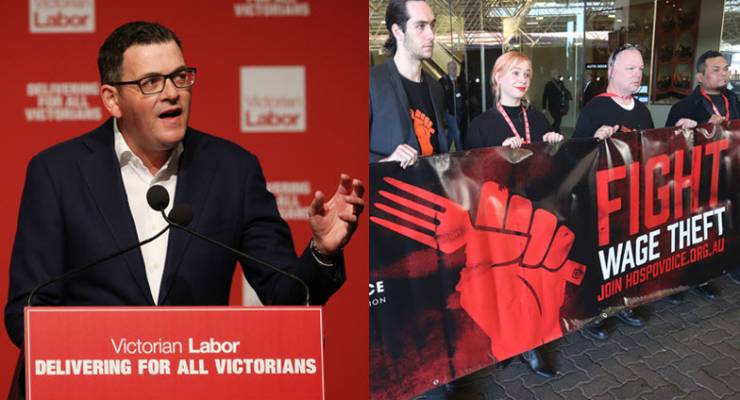
L: Dan Andrews at the Victorian Labor state conference; R: victims of wage theft outside the same event.
Over the weekend, the Andrews government announced that, if re-elected in the upcoming Victorian state election, they will introduce new laws that would send employers who “deliberately underpay or don’t pay their workers” to jail for up to 10 years.
It follows similar announcements by the state Labor parties in New South Wales and South Australia. But, assuming Andrews is reelected, this would be the first time such laws have actually been implemented.
The government said on Saturday:
Wage theft offences will be investigated and prosecuted by the Victorian Wage Inspectorate — a new employment watchdog the Labor government is establishing to promote fair industrial relations practices and better education, compliance and enforcement of state-based employment laws.
The phrase that stands out there is “state-based”. The states in Australia — apart from Western Australia — have all more or less handed their power over employment law to the federal government. Victoria was the first state in Australia to do so, way back in 1996.
As the statement goes on to state, the Victorian Wage Inspectorate currently mops up the scraps that are still under state jurisdiction:
… New long service leave laws, child employment and owner-driver laws. It will also oversee labour hire licencing and enforcement, and establish portable long service leave for contract cleaning, community services and security industry workers.
University of Adelaide Law School Professor Andrew Stewart told Crikey that if the proposals were limited in this way “it wouldn’t criminalise wage theft at all”.
But the initial reporting suggest the fines will cover conduct such as deliberately withholding wages, superannuation or other entitlements, falsifying employment records or failing to keep them at all. These areas are covered by the federal Fair Work Act, which excludes state industrial laws.
“We’re in a grey area here, because it’s clearly questionable whether the Victorian government could actually introduce and implement these kinds of laws,” Stewart said. “They would have to either closely collaborate with the federal government, which seems unlikely, or possibly mount a constitutional challenge.”
Previous high court challenges to the federal governments jurisdiction over employment law have been unsuccessful.
“It may well be a drafting issue, they may draft it so as to argue it’s not an industrial law, that it’s just out and out theft and therefore purely criminal,” Stewart said. “They must have received advice that it’s possible. But it’s hard to see that it won’t encounter a challenge as soon as they try to enforce it.”
“Sending dodgy bosses to jail” makes a good grabby headline in the lead-up to the election and gives the impression of responding to the “change the rules” campaign, which has long called for these laws at a federal level. But is it just an unenforceable gesture?
“The Andrews Labor Government is standing up for all workers, particularly our most vulnerable, by making sure they receive the pay they deserve,” a Victorian government spokesperson told Crikey. “The Wage Inspectorate will ensure compliance and enforcement of employment conditions right across Victoria.”








About time.
I steal from you, or you from me, we risk porridge; if a servant steals from his master/employer same applies – that’s the law.
Why shouldn’t the same law apply to employers stealing from employers?
…umm, I’ll take at stab at “coz they are job creators and technical laws don’t apply to them”.
“….. stealing from employees” of course.
Make wage theft an offence under the Victorian Crimes Act and have the Victorian Police enforce it just like any other form of property theft.
One reason this move to “jail the dodgy employers” might not gain much traction might have been revealed last weekend in the Sunday Age. It is that those elites who represent the employers–and therefore, one assumes, also the employers themselves–think that the term ‘wage theft’ is “emotive”. It seems that ‘shop-theft’ is not only allowable (and we’re asked to use that term now, rather than ‘shoplifting’), and is highly desirable as a direct line to the beak, but ‘wage-theft’ is unfairly pejorative. My case is rested…
Some people seem to think wages are a privilege – “bestowed on the employees by benevolent employers” (the “sometimes” intimation of “Business leader” Ming Long? The Dum May 28)?
But wages are money in exchange for something, in this case “work”.
Get a plumber in to do up your shower and then refuse to pay them or wanted to pay less then billed, and see what happens?
If you took a TV or a car without paying for it you’d be charged with theft?
Refuse to pay a surgeon for an operation – and see where you go?
What’s the difference between other sorts of “theft” and someone taking someone else’s “services” for less than an agreed value? “Caste”?